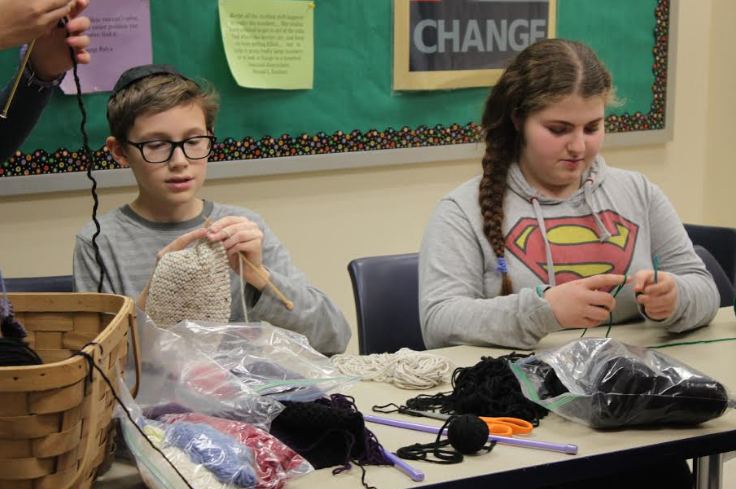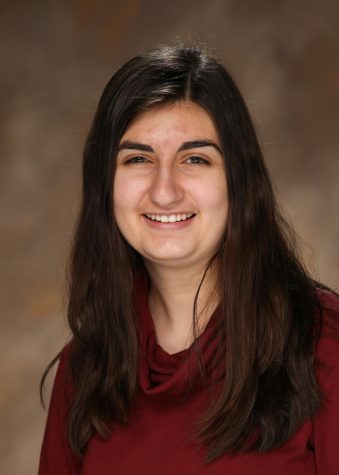Funky Friday
Middle school develops experiential learning program
November 28, 2016
Finance, human behavior and computer science are not your typical middle school classes, but as the week comes to a close, students in the middle school experience a unique day of learning that draws on their knowledge from their core classes.
As part of the middle school’s redesign, students in grades six through eight are now given the opportunity to have experiential and interdisciplinary learning classes every Friday.
The middle school Friday schedule is comprised of Kolot, an advisory period; Lion Time, a time for students to meet with teachers; and Huggim, a period for activities that overlaps with high school lunch to facilitate interactions between middle school and high school students with common interests.
The schedule also includes four interdisciplinary classes: a Judaics Workshop, a Math-Science Workshop, an Elective Workshop and Experience.
According to Middle School Principal Rebecca Weisman, the new Friday schedule allows teachers to focus on helping students build skills that they will need in high school and beyond.
“We also want to make sure we’re looking at the whole child,” Weisman said. “That’s something in general at JDS that we care a lot about. It’s not just about students’ cognitive development, it’s not just about their emotional development, it’s not just about their moral development; we look at the big picture of the whole child.”
The Experience block is a time dedicated for each grade to study several different units throughout the year. The class only occurs on Friday, and the area of study can change every week or be part of a multi-week lesson. The sixth grade, for example, will work on a TED Talk project as one of their units. The seventh grade will have a Holocaust and Human Behavior unit, which studies the Holocaust and anti-Semitism. The eighth grade will complete their Capstone project, which encourages students to use a variety of skills to help a community that they care about.
The Experience units consist of areas of study that were either previously taught in other disciplines or that were not taught in the core curriculum. The first unit this year for the eighth grade was about financial literacy. This six-week unit focused on teaching students the fundamentals of finance so that they can make informed decisions about how they spend their money as they get older.
“The idea was [that] we teach it in eighth grade in this experiential way,” history teacher Dr. Eytan Apter said. “It could plant the seeds so that when they get a credit card, they understand these ideas.”
Much of the financial literacy unit focused on prompting students to think about their futures. Eighth-grader Drew Sadikman said that for one activity in the class they were given a salary and a budget, and had to allocate money for food, clothing, savings and other expenses. Another time, students learned about saving for retirement.
The class also discussed the idea that every decision comes with a trade-off, such as the consequences for going over budget on a credit card. Sadikman said that they learned about having to pay off credit card debt and that “it’s better to just keep to your limits.”
Sadikman believes that eighth grade is a useful time to take this course because it helps students who are about to enter high school think about their futures. Financial literacy is an important part of this future, Apter said, and the skills taught in the course can help students succeed as adults.
“The more financially literate you are, the more you can look out for your own interests,” Apter said. “You don’t have to feel like you’re not empowered.”
Like the financial literacy unit, the Coding elective also aims to prepare middle school students for their futures. In this class, computer science and STEM teacher Andy Petusky teaches middle school students the coding language CoffeeScript, a language similar to JavaScript that is used by adults in the workforce.
According to Petusky, coding is beneficial because students get to see how concepts from other classes, such as math, are applied in real-life situations. Additionally, in their coding elective, students learn how to think algorithmically and in a computational manner. Students are often presented with coding challenges in class and have to figure out how to apply the simple tools and concepts they have learned to find a solution.
“That problem solving and logic and applying that, it’s really good for kids’ brains and helps them be better thinkers,” Petusky said. “You can’t start that too early, but this is a way that it’s not pushing them too far. It’s just right, so they’re getting this benefit along the way.”
Weisman also stressed the importance of instilling students with the proper tools and values to succeed in high school and later in life.
“We think it’s a really valuable piece, helping students be caring, compassionate, confident thinkers who engage the world through Jewish values,” Weisman said. “I think our students will be well served going into high school, because they will have had all these different experiences and we’re really excited to have a program that offers it now.”








